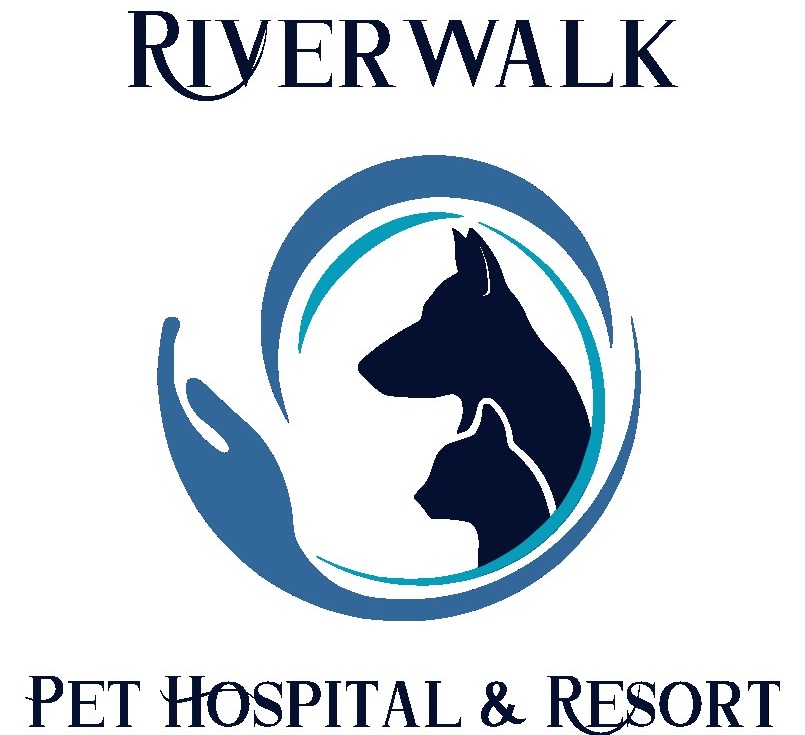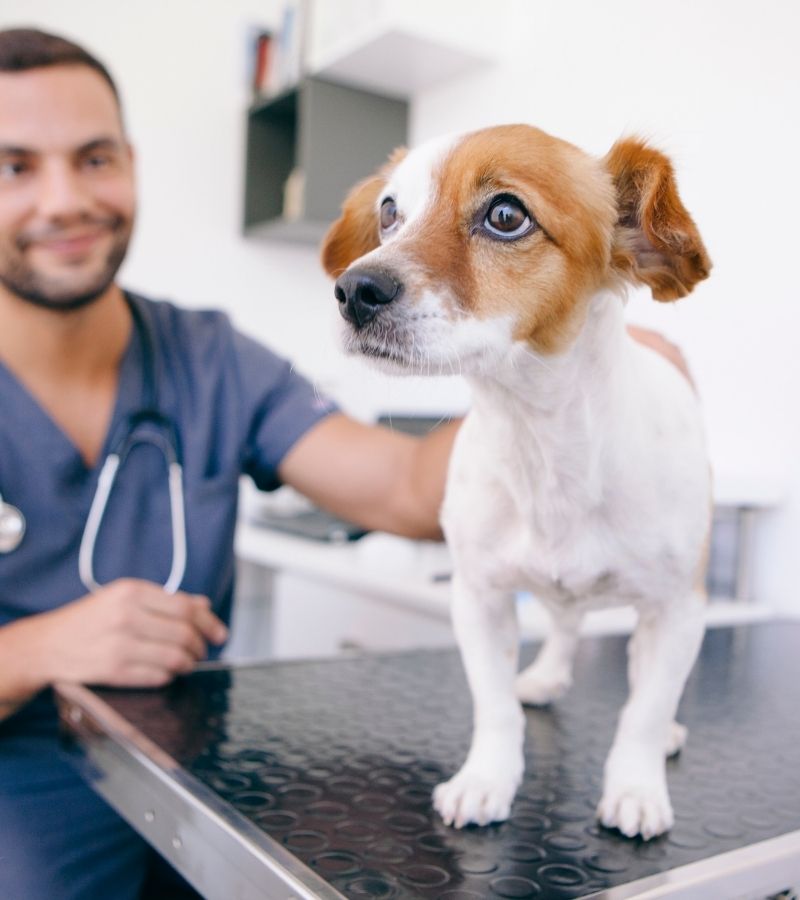Riverwalk Pet Hospital & Resort
Pet Preventative Care
Comprehensive physical examinations, immunizations, proper nutrition, maintaining proper weight, exercise, and parasite prevention are the cornerstones of a healthy life.
Pet Preventative Care
The veterinary professionals at Riverwalk Pet Hospital & Resort strive to prevent illness. Our preventative care recommendations focus on the ultimate goal… the longest, healthiest, happiest life possible for pets.
Pets are unique and the care they require should be unique as well. We strive to create a health plan that will optimize the care and prevention needed for your pet, depending on their risk factors and life stage.
Did you know that pets age at a faster rate than human beings? See the “Pet Age in Human Years” chart to learn how old your pet is in human years.

On average, an exam performed once a year for a pet is the equivalent to a human visiting a doctor every 6 or 7 years. In addition, many animals, especially cats, are masters at hiding health problems. An examination by an experienced veterinarian provides the opportunity to discover health concerns that might otherwise go undetected. The benefits of early discovery can lead to an increased quality of life, less pain, and decreased cost.
At a minimum of once (preferably twice) per year, a pet’s wellness care should include:
- Comprehensive wellness examination
- Intestinal parasite screening
- Heartworm testing and prevention
- Flea and tick control
- Diet evaluation
- Vaccination program (dependent upon pet’s lifestyle/exposure risk)
- Wellness blood screening/testing
Wellness examination: What happens during a wellness examination? Your pet’s visit will begin with a trained veterinary technician or veterinary assistant obtaining medical history for your pet. In addition, the technician or assistant will gather important vital signs such as weight, body condition score, pulse, respiration rate, and temperature. Next, the veterinarian will perform a complete body system examination that will include the following assessments:
- Overall demeanor (is the pet bright and alert?)
- Weight (under, ideal, or over)
- Hair coat and skin (dryness, oiliness, shedding, abnormal hair loss, lumps, bumps, areas of abnormal thickening)
- Eyes (redness, discharge, excessive tearing, lumps/bumps on eyelids, cloudiness, other abnormalities)
- Ears (discharge, thickening, hematoma, hair loss, infection, other abnormalities)
- Nose and face (symmetry, discharge, breathing ability, other abnormalities)
- Mouth and teeth (tartar build-up, periodontal disease, retained or broken teeth, excessive salivation, ulcers)
- Heart and lungs (heart rate, heart rhythm, heart murmurs, increased/decreased breath sounds)
- Lymph nodes in the neck, head, and hind legs (swelling or pain)
- Legs and paws (lameness, muscle problems, issues with nails/paws, nerve problems)
- Abdomen (palpation of the bladder, kidneys, liver, intestines, spleen, and stomach to assess whether these organs appear normal, or whether the pet exhibits discomfort)
If you have questions about your pet’s health and well-being, the wellness examination visit is an ideal time to speak with a veterinarian about your concerns.
Vaccinations: Immunizations that have been handled appropriately, administered properly, and given at the correct intervals can help protect pets from disease. When designing a vaccination program for your pet, our veterinary professionals will consider your pet’s lifestyle and disease risk exposure before making recommendations.
Maintaining an up-to-date vaccination record is important, especially if you travel with your pet, allow them to board at an out-of-home facility, receive professional grooming, attend dog daycare, or venture to dog parks. If you need a copy of your pet’s immunization records… just give us a call or send us an email with your request. We would be happy to assist you!
Intestinal parasite screening and prevention: Both cats and dogs are susceptible to infections by internal and external parasites. Unfortunately, some of these parasites are zoonotic (possess the ability to infect people as well as animals). For this reason, the prevention of intestinal parasites is important for the health of the entire family.
Most intestinal parasites are not visible in feces or by the naked eye. Your veterinary team can screen for infection by obtaining a small feces sample and processing it by performing a microscopic analysis.
In addition to intestinal parasite screening, periodic deworming and parasite prevention medications are likely to be recommended and/or administered.
Symptoms of intestinal parasite infection can include vomiting, diarrhea, weight loss, and poor overall body condition. Because of the risk to pets and humans, it is important to perform intestinal parasite screenings and include monthly preventatives in the routine care of family pets.
Heartworm Prevention: Heartworm is a worm that resides in the heart and lungs of infected dogs and cats. Unfortunately, heartworm disease is prevalent in our area due to the primarily mild temperature, level of humidity and abundant water sources.
Heartworm larva is transmitted from pet to pet by mosquitoes. Once a pet is bitten by a larva carrying mosquito, the larva will complete its life cycle in its host (your dog or cat) and become capable of causing a life-threatening disease. Signs of heartworm infection can include:
- Respiratory problems
- Coughing
- Exercise intolerance
- Vomiting
- Weight loss
- Sudden death
Fortunately, heartworm infection is a preventable disease, and there are several exceptional prevention options available for both dogs and cats. These products, when provided year-round, give excellent protection against heartworms. Many preventatives also protect against several species of intestinal parasites that can harm pets as well as people. You can find more information here.
Flea and Tick Prevention/Control: Fleas and ticks are bothersome and potentially dangerous external parasites. Flea and tick problems can be difficult to treat. Therefore, we recommend a year-round, complete (pet and environment) prevention program. Health concerns associated with fleas:
- Itching and discomfort
- Flea allergy dermatitis
- Anemia
- Tapeworms
- Health concerns associated with ticks:
- Ehrlichiosis
- Lyme disease
- Rocky Mountain spotted fever
- Anaplasmosis
Fortunately, several effective flea and tick preventives are available to assist in the war against these parasites. Pet owners may be tempted to purchase an over-the-counter product to protect their pets from these parasites, but please be cautious since many of these items can have serious side effects if used improperly. In addition, some products are known to have limited effectiveness.
Nutritional counseling: Similar to humans, what pets put into their bodies is extremely important. The quality of nutrition your pets eat can positively or negatively influence their overall health and well-being. Our staff can guide you through your pet’s nutritional needs for each stage in their life. In addition, our hospital can also provide information on diets that assist in the therapeutic maintenance of many different health concerns (heart, kidney, skin, urinary, etc.)
Wellness blood screening/testing: Like in human healthcare, routine blood work for pets enables veterinarians to establish baseline blood values for your pet. In addition, performing blood work at routine intervals can help detect subtle changes and assist in diagnosing diseases early. Early detection = early intervention!

